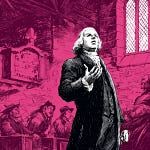Question 12: What is natural revelation?
Answer: Natural Revelation is a creative, sustaining act of God in which he clearly, truly, and authoritatively reveals himself and his works to all men through the natural, created order, so that his people can worship, glorify, enjoy, love, know, and serve him forever.
Under the previous question, we addressed in part the idea of natural revelation, and saw that Christ, as the creative word of God, created and upholds all things. It will be worth our time to pause a moment and express more clearly the nature of natural revelation. We have a definition before us, so let’s explore a few of the points we’ve laid out here.
Firstly, natural revelation is a creative act of God. Everything we see in creation entirely originates from and is the product of the divine mind. “In the beginning, God created the heavens and the earth” (Gen 1:1). There is not a principle of knowledge in all of creation that did not proceed from the Divine mind, and therefore there is not an ounce of knowledge anywhere that does not belong to him (Pr 1:7).
Secondly, not only is natural revelation a creative act of God, but it is a sustaining act of God. God’s act of creation is not like a watch that he made, wound up, and then left to tick along by itself. He created it, but he now sustains it in each and every moment as the Divine Sovereign of the universe. In Job 34:14 we read that if God were to “gather to himself his spirit and his breath, all flesh would perish together.” It is his power alone that sustains us and all things at every moment. As you live and see your life unfold before you, you are witnessing the power and presence of God at work in creation at every point, at all times. Again, for this reason the apostle said that God is “not far from each one of us,” and that “in him we live and move and have our being” (Acts 17:27-28). He is intimately involved in every moment of history, his glory is abundantly displayed at every point. Truly “the whole earth is filled with his glory!” (Is 6:3).
If you want to get this idea of “sustaining” into your head a bit more forcefully, consider the word: “movement.” Creation is a constantly moving, living, breathing revelation, pulsating with the power of the Creator at all times and in all places. I was watching a bumble bee the other day, it was marvellous! It flitted between the heads of the lavenders, a soft buzzing yellow against the mellow lilac of the flower heads. It gathered… flitted… never stopping, its tiny wings perfectly suited to its task, its work ethic impeccable. How many miles would it fly to take its treasure back to the hive? As a watcher observes the hands of the artist, so I watched the artistry of God’s creation in motion. At every moment the beauty and majesty of God is visible. At every turn his boundless wisdom is on display. At all times he is near to us. Creation itself is a true unfolding of his brilliance, his majesty on constant display, it is his masterpiece in progress. He created it, he sustains it, and he is intimately at work in and through it at all points. Creation and history is in every sense a continuing revelation of his glory that will culminate in a great unveiling at the end of time.
Here’s the third thing. God clearly (and) truly, … reveals himself and his works to all men in natural revelation. Romans 1 makes it very clear in verse 18 and following that “what can be known about God is plain” from his creation. His “invisible attributes,” his “eternal power and divine nature” it’s all right there as plain as day (and night). We don’t see God when we look at creation (we’re not pantheists after all), but we do see his handiwork. We see the fruit of his labours and the workings of his mind. And as we look at it, as we discover the wonders of knowledge he has embedded in it, we see his works too. We see his music, his architectural designs, his artistic supremacy. We taste the wonders of all the flavours he has given to us. All of it is his work. Creation reveals God and his works. Bavinck puts this nicely: “In natural revelation his divine and eternal thoughts have been deposited in creatures in a creaturely way so that they could be understood by human thought processes” (Bavinck, Reformed Dogmatics Vol 1, p.310). We can all see it, it’s right there, perfectly clear. Acts 14:17 says: “Yet he did not leave himself without witness, for he did good by giving you rains from heaven and fruitful seasons, satisfying your hearts with good and gladness.” Calvin is a classic too:
“men cannot open their eyes without being compelled to see him… upon his individual works he has engraved unmistakable marks of his glory, so clear and so prominent that even unlettered and stupid folk cannot plead the excuse of ignorance” (Calvin, Institutes, Bk 1, Ch 5.1).
The fourth thing to see here is that God’s natural revelation is authoritative (Van Til, Doctrine of Scripture, p.4-5). This might sound a little funny, but it makes sense when you think about who God is. If, as we’ve seen, all truth, knowledge, and thinking is derivative of God, if it is ours to receptively reconstruct God’s thought in all we do, then of course his revelation is authoritative by nature. He’s made this place, he’s running the show, and it all runs according to the principles he’s laid out. Let me give you a few examples to prove my point. We can’t jump off a building and not expect gravity to kill us. We can’t speak gobble-de-gook and expect people to understand us. We can’t expect to have a junk-food diet and not get fat. God’s natural revelation is loaded with principles of knowledge whereby creation is governed and which we must discover and by which we must live. If we rebel against the inherent authority of these creation principles, we must expect to suffer the consequences. God’s natural revelation is authoritative. “General revelation does indeed yield revelatory data which God expects us to understand, believe and obey. Paul has no reservations on this point in writing to the Corinthians, ‘Does not nature itself teach you…?’ (1 Cor 11:14)” (Martin, You Lift Me Up, K.E. Loc.1359 of 1889).
The final point which I have made in my definition is that natural revelation was created “…so that his people can worship, glorify, enjoy, love, know, and serve him forever”, and this is a good point on which to close our meditation. What we’re really doing here is answering the question of why God revealed himself in the natural order, we’re talking about the reason why truth proceeds from the mind of God. In the most basic and original sense, natural revelation glorifies God by providing us with a place, or context, in which we can worship, serve, enjoy, and relate with our Creator. The garden (Gen 1-2) gives us a microcosm of this, a seedling form. God’s natural revelation provides a place for human life to flourish under God and in relationship with him.
God’s purpose for your life and mine is that we should see the world as it truly is, and to respond with worship and adoration. Only a heart blinded by unbelief could fail to respond in that way. Sadly, unbelief has become our natural estate, and even as believers made new in Christ, unbelief still wages war on our souls. So too we are called to serve God with this world in which we live, to render under him that which is his – which is everything! (Ps 24:1). And we are called to truly enjoy this creation, receiving all things with thanksgiving (1 Tim 4:4). Everyone has a view of the world and what it is, and that view defines the way that they live heir lives. In Christ, we have received a renewed and true perspective on the world that God has made. In closing, a word from Bavinck:
“The creation is the first revelation of God, the beginning and foundation of all subsequent revelation. The biblical concept of revelation is rooted in that of creation… immediately linking up with the event of creation is the action of providence… All that is and happens is, in a real sense, a work of God… That is how Scripture looks at nature and history. Creating, sustaining, and governing together to form one single mighty ongoing revelation of God.” (Bavinck, Reformed Dogmatics, Vol 1, p.307).
SDG.














Share this post